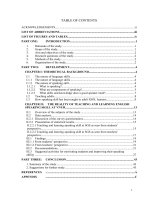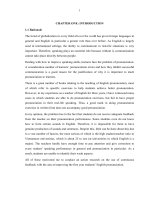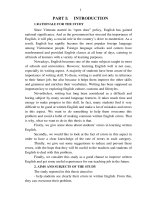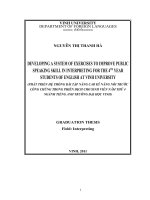Motivational changes in students of English at International school, Vietnam National University, Hanoi during preparatory programs = Những thay đổi trong động .PDF
Bạn đang xem bản rút gọn của tài liệu. Xem và tải ngay bản đầy đủ của tài liệu tại đây (610.31 KB, 16 trang )
VIETNAM NATIONAL UNIVERSITY, HANOI
UNIVERSITY OF LANGUAGES AND INTERNATIONAL STUDIES
FACULTY OF POST-GRADUATE STUDIES
PHẠM THỊ TUYẾT MAI
MOTIVATIONAL CHANGES IN STUDENTS OF ENGLISH AT
INTERNATIONAL SCHOOL, VIETNAM NATIONAL UNIVERSITY,
HANOI DURING PREPARATORY PROGRAMS
(Những thay đổi về động lực học tập của sinh viên tiếng Anh của Khoa
Quốc tế - Đại học Quốc Gia Hà Nội trong quá trình học dự bị tiếng)
M.A. MINOR THESIS
Field : English Teaching Methodology
Code : 601410
H NI, 2011
VIETNAM NATIONAL UNIVERSITY, HANOI
UNIVERSITY OF LANGUAGES AND INTERNATIONAL STUDIES
FACULTY OF POST-GRADUATE STUDIES
PHẠM THỊ TUYẾT MAI
MOTIVATIONAL CHANGES IN STUDENTS OF ENGLISH AT
INTERNATIONAL SCHOOL, VIETNAM NATIONAL UNIVERSITY,
HANOI DURING PREPARATORY PROGRAMS
(Những thay đổi về động lực học tập của sinh viên tiếng Anh của Khoa
Quốc tế - Đại học Quốc Gia Hà Nội trong quá trình học dự bị tiếng)
M.A. MINOR THESIS
Field : English Teaching Methodology
Code : 601410
Supervisor : Ass. Prof. Dr. TRẦN XUÂN ĐIỆP
H NI, 2011
iv
TABLE OF CONTENTS
CANDIDATE’S STATEMENT i
ABSTRACT ii
ACKNOWLEDGEMENTS iii
TABLE OF CONTENTS iv
APPENDICES vi
LIST OF ABBREVIATIONS vii
PART I: INTRODUCTION 1
1. Rationale of the study 1
2. Objectives of the study 2
3. Scope of the study 2
4. Methods of the study 2
5. Design of the study 3
PART II. DEVELOPMENT 4
Chapter 1. Theoretical background of motivation 4
1. Definition and the nature of motivation 4
2. Roles of motivation in language learning 6
3. Types of motivation 7
3.1. Integrative motivation 7
3.2. Instrumental motivation 8
3.3. Integrative vs. Instrumental motivation 8
4. Factors affecting student motivation in L2 learning 10
4.1 Learner’s factors 10
4.2. Course Material Factors 11
4.3. Teacher Factors 12
Chapter 2. Literature review 13
Chapter 3. Methodology 16
v
1. Subjects of the study 16
2. Data collection instruments 17
2.1. Questionnaire for students 17
2.2. Interviews for teachers 18
3. Data analysis 18
4. Data analysis and Findings 18
4.1. Questionnaire data 18
4.1.1. Multiple choice questions 18
4.1.2. Open-ended questions 24
4.2. Interviews with teachers. 26
5. Discussion of the findings 32
6. Pedagogical implications 33
6.1. Maintain their instrumental motivation and enhance their integrative
motivation 35
6.2. Care for students’ needs and interests 34
6.3. Have students participate 34
6.4. Give compliments and rewards 35
6.5. Be enthusiastic, helpful, friendly and tolerant 35
PART III. CONCLUSION 36
1. Recapitulation of the main ideas 36
1.1. Summary of the theories 36
1.2. Summary of the research procedure 36
1.3. Summary of the findings 37
1.3.1. Students’ motivational changes 37
1.3.2. Techniques and activities used by teachers 37
2. Limitations and suggestions for further studies 38
vi
APPENDICES
APPENDIX A III
APPENDIX B VII
1
SUMMARY OF THE RESEARCH
In an attempt to investigate motivation and motivational changes among students of
Preparatory Programs at International School (IS), VNU, the main purposes of the research
were to find out (1) the current situation of being without motivation of many students when
they first come to International School, (2) causes of such a situation, (3) changes in the levels
of motivation after students have studied there for a certain time and (4) suggestions to raise
students’ levels of motivation.
The subjects of the study were 50 students and 3 teachers of Preparatory Programs.
The teachers were asked to join in an interview and students to answer a survey questionnaire.
As the findings show, students’ levels of motivation have changed after they have learned at
IS for a certain time, many students, from being unmotivated, have found interest and goals in
learning in here, that is because of a number of factors relating to their self-awareness,
teachers’ support, learning environment, etc. Finally, the study recommends that in order to
maintain students’ interest in learning, teachers should vary teaching methods, adapt
textbooks, focus on students’ needs, provide students with a variety of appropriate tasks and
activities and be enthusiastic, friendly and tolerant as well.
The result will be presented in three parts.
The first part, INTRODUCTION, presents the rationale, the aims, scope, methods,
design of the study and definition of key terms.
The second part, DEVELOPMENT, includes three chapter: Theoretical Background
presents concepts relevant to the topic; Literature Review looks at previous studies into
motivation; and Methodology provides the methodology underlying the research site which
includes the general information about the study subjects and the situation of motivation at IS.
This chapter also focuses on the method of data collection.
The last part, CONCLUSION offers a recapitulation of the main ideas, limitations of
the study, and suggestions for further studies.
2
PART I: INTRODUCTION
1. Rationale of the study
From a centre-sized school, International School, VNU has developed both in size and
quality with more and more students each intake every year. However, it does not necessarily
mean students have found their motivation in here. They come to IS for a variety of reasons,
but above all, IS does not take students through University Entrance Exam so it is a second
chance for the majority of those failing other Universities.
Therefore, it is a fact that when students first come to IS, many of them lose self-
confidence, either because of embarrassment of failing the university entrance exam or low
level of English or unfamiliarity with foreign teachers and so on, which makes class
environment and teacher-student relationship stressful.
Authority and lecturers at IS have gone different length to encourage students to learn,
with a hope that their students can find their confidence, and develop both instrumental and
integrative motivation. Therefore, an analysis of their motivation and motivational changes
during their study at IS will be conducted to determine whether instrumental or integrative
motivation is the preference of IS students, thus eventually give some suggestions to make IS
students more confident and eager in their study.
2. Objectives of the study
This study is carried out to meet the following objectives:
1) Analyze the reasons why many students do not have motivation
2) Analyze changes in the levels of motivation
3) Offer options to raise students’ levels of motivation.
3. Scope of the study
3
The study only focuses on an overview of current situation of English learning among
students of Preparatory programs at IS.
4. Methods of the study
To achieve the aims of the study, the researcher uses survey research and both
quantitative and qualitative methods are used in completing the following tasks:
- through a questionnaire from 50 students of Preparatory Programs.
- through interviews from 3 teachers teaching at Preparatory Programs.
All comments, remarks, recommendations and conclusion are based on the data
analysis.
4
PART II. DEVELOPMENT
Chapter 1. Theoretical background of motivation
1. Definition and the nature of motivation
Motivation is not easy to understand or explain; whenever we feel a desire of need for
doing something, we are motivated. Different people are motivated by different things and
motivation is some kind of internal drive that encourages somebody to pursue a course of
action (Harmer 1991: 3).
Although there are numerous different definitions of motivation (by Gardner, Wlodwoski,
Ellis, etc.), it is commonly thought of as “the process of arousing, directing, and maintaining
behavior” (Burden 1994:261).
2. Roles of motivation in language learning
Motivation and learning is the study of how to harness learners’ intrinsic interest –
their inherent curiosity and sense of wonder about the world – to help them learn (Lepper
1998: 2).
- According to Gardner and Lambert (1972), motivation to learn a language is
grounded in positive attitudes towards the language community and in a desire to
communicate with valued members of that community and become similar to them.
- Littlewood (1995: P53) noted that in language learning as in every other filed
of human learning, motivation is the crucial force which determines whether a learner
embarks on task at all, how much energy he devotes to it and how long he perserves. It is a
complex phenomenon which includes many components: the individual’s drive, need for
achievement and success, curiosity, desire for stimulation and new experience, and so on.
Gardner (1985: P10) defined motivation for language learning as “the extent to which an
individual works or strives to learn the language because of a desire to do so and the
satisfaction experienced in this activity”.
5
3. Types of motivation
- Integrative motivation: a favorable attitude toward the target language community;
possibly a wish to integrate and adapt to a new target culture through use of the language.
- Instrumental motivation: a more functional reason for learning the target language,
such as job promotion, or a language requirement
4. Factors affecting student motivation in language learning
According to Cottrell, 2001, whether students are motivated or demotivated are due to
the following factors:
4.1 Learner’s factors
- The Self-belief
- Vagueness about the Objectives of Learning
- Past experience of learning.
- Inefficient Learning Strategies
- Attitudes:
4.2. Course Material Factors
4.3. Teacher Factors
.
6
Chapter 2. Literature review
There have been quite many researches into integrative motivation, the definition and
its roles in language learning.
Persson and Ljungman (2009) carried out a study in Thailand and it was shown that
integrative motivation is prominent.
The effect of integrative motivation appears to be weaker in other situations, where
learners hardly have chances to use the language outside classrooms.
Lukmani (1972) found that female Marathi speakers in Bombay were more related to
instrumental motivation than integrative motivation.
Berwick and Ross (1989) conducted a study among a group of 90 first-year Japanese
university students who enrolled in an international commerce and a compulsory English
course. It was found that those student have instrumental motivation as they hoped to pass the
university entrance exam, but as soon as learners achieve their goals, there is no reason for
them to continue learning. In contrast, those with integrative motivation can keep their interest
for long.
However, in some studies, the learners’ reasons for studying cannot be labeled either
integrative or instrumental motivation, like in the study of Benson (1991).
7
Chapter 3. Methodology
1. Subjects of the study
The subjects of the study consist of 53 participants in 2 groups:
The first group includes 50 students of Preparatory Programs, IS with different levels
of English (from Beginning to Upper-intermediate levels).
The second group involves 3 teachers aged from 26 to 34. They have been teaching
English in Preparatory Programs, IS for at least 4 years.
2. Data collection instruments
2.1. Questionnaire for students
The questionnaire is aimed to find out about students’ experience in learning English
at IS and their notice of how their levels of motivation have changed after some time at IS.
2.2. Interviews for teachers
The 20-minute interviews were structured with a list of 8 open-ended questions and
aimed to get their evaluation of their students’ motivation to learn in English classes. Also, it
is hoped to collect their ideas of how to best motivate students as well as what to avoid if
teachers would like to encourage students’ interest in learning English.
3. Data analysis
The quantitative data gathered has been classified and converted into percentage to
compare responses to the items.
The qualitative analysis has been carried out to analyze the data via the open-ended
questions of the questionnaire, and interview.
8
PART III. CONCLUSION
1. Recapitulation of the main ideas
1.1. Summary of the theories
The study presented concepts relevant to the topic such as definition of motivation,
roles of motivation in language learning, types of motivation, factors affecting motivation. It
also looked at previous studies into two types of motivation: integrative motivation and
instrumental motivation.
1.2. Summary of the research procedures
The study permitted an investigation of Motivational changes among students of
English at International School, Vietnam National University, Hanoi during Preparatory
Programs with a view to analyzing the situation of students’ demotivation when they first
come to IS, finding reasons for this situation, noticing any changes after students have studied
there for a certain time to finally offer suggestions to raise their levels of motivation.
The study gave an overview of what motivation is, its roles in language learning, types
of motivation, and factors affecting motivation. Also, the study looked at previous studies by
famous researchers which investigated carefully two types of motivation: integrative and
instrumental.
In the study, the participants were 50 students and 3 teachers of English Preparatory
Programs at IS. Special care was taken to select a mixture of students from all levels, from
beginner to upper-intermediate. The three teachers were chosen in interviews to see students
in the eyes of the instructors.
In order to fulfill the objectives of the study, questionnaire for students, interviews for
teachers were used. The questionnaire included 8 multiple choice questions. Open-ended
questions were also added. Then, the data was analyzed using both quantitative and
9
qualitative methods. In the light of the analyses made, the following implications and
suggestions were made.
1.3. Summary of the findings
The findings of the study will be summarized on the following aspects:
1.3.1. Students’ motivational changes
It was concluded from students’ responses in the questionnaire and teachers’
evaluation in the interviews that students themselves and teachers noticed certain changes in
students’ motivation to learn English. From being demotivated as a result of failing University
entrance exam, many students have found their interest in IS, VNU, with foreign teachers,
devoted teachers, good friends, modern facilities, etc. However, it is observed that there still
remain quite a number of students who cannot find the joy of learning, no matter what
teachers and the school have done.
Anyway, the major kind of motivation for IS students to learn English is instrumental
motivation. Most of them are learning to pass exams, complete the Preparatory Programs and
move forward to University Programs, some good students are trying hard to get scholarships
from the school. A necessity for communicating with English speaking people was not
regarded as their main reason, though some students said that they are keen on meeting and
speaking to foreigners.
1.3.2. Techniques and activities that should be used by teachers
In order to stimulate students to learn English, teachers at IS should try different ways.
Firstly, it is important to encourage students to develop both integrative and instrumental
motivation. Also, the teachers should maintain the students’ interests by integrating games
between lessons to relieve students from stress and tiredness, and creating interesting topics to
suit students’ needs. Materials are also adapted to match their levels of English.
At the same time, a variety of activities like team work, group discussions, and role
plays should be carried out frequently. Moreover, teachers are ready to give students
10
compliments and praises if they volunteer answers or do something right and try to avoid
complain or criticism if they give wrong answers. Above all, the teachers need to give their
students the impression that they are tolerant, friendly and enthusiastic.
2. Limitations of the study
Since the study has been confined to the scope of an M.A. thesis, much remains to be
done.
First, the study only carries out an investigation into the motivation changes in
students of Preparatory Programs, not in a larger scale. Thus, to some extent, the findings may
not be generalized to all students at IS.
Second, there are many types of factors affecting student motivation, and thus, many
ways for teachers to motivate their students to learn but the number of factors and techniques
in this study are still limited.
Third, all the findings are based on the responses of students and teachers in the
questionnaire and interview, so they may not be as vivid and reliable as the researcher’s
observations of real classes.
3. Suggestions for further studies
The mentioned limitations call for further research.
The first suggestion for those interested in motivation of IS students is to carry out a
larger-scale research in the whole school, including Preparatory Programs and University
Programs to have more general findings and conclusion.
It is also recommended that the further study take a deeper investigation into
techniques used by teachers to motivate students to learn, especially tips in organizing and
conducting activities in a language class.
11
Besides, in order to have a more objective and vivid look, researchers can observe
some classes to eyewitness how motivated the students are and what the teachers do then
counter check what they response in the questionnaire and interviews.









